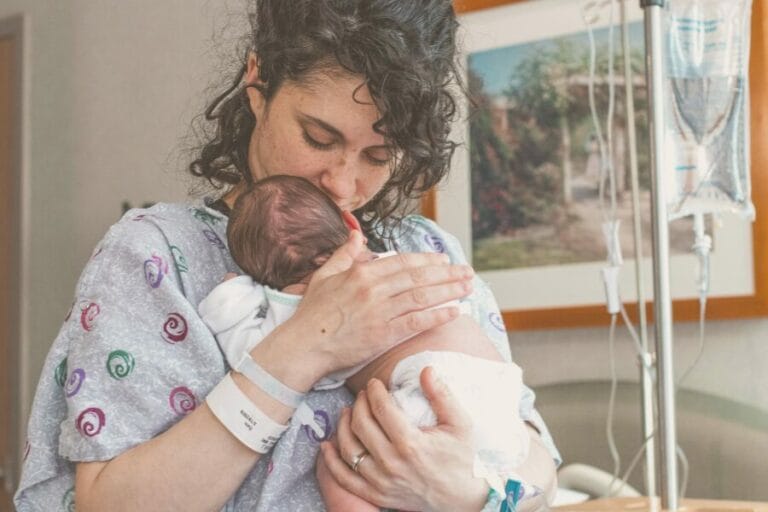The Ups and Downs of Hormones & Your Postpartum Recovery Timeline
Your Postpartum Hormones Timeline at a Glance

Week 1 of Postpartum Hormones - What to Expect
During the first few days after birth, you’ll have so much going on in both your body and mind. Proper postpartum care is vital, whether you had a c-section or vaginal birth, do your future self a favor and look at our list of what to do and what not to do after pregnancy. We’d also like to take the time to give you the background on why you may react differently than usual during the recovery process.
While pregnant, your placenta is the main producer of certain hormones. Once the placenta leaves your uterus, your body has a massive hormonal change. You will feel the hormone drop. Trust us, mama, but don’t fret. Being emotionally prepared for the 4th trimester will help adjust. These four hormones are effected: Estrogen, Progesterone, Prolactin, and Oxytocin. The more drastic changes occur during the first days of the postpartum period. Because of this, you will be experiencing at least some symptoms.
Firstly, your estrogen will drop off a cliff which can lead to mood swings and fatigue. It’s normal to feel very tired, as your body works to recover from delivery.
The high progesterone levels prior to birth will also decrease significantly alongside estrogen. This can have the benefit of removing some of the uncomfortable symptoms of pregnancy like bloating and constipation. However, the sudden drop is also commonly thought to be a contributor towards postpartum depression. It’s natural and perfectly ok if you swing from pure joy to feelings of sadness. You really can blame it on the hormones.
On the other hand, prolactin climbs immediately after childbirth and kick starts the production of breast milk. This actually increases in the body while breastfeeding. The more frequent you nurse, in these first few days, the higher your prolactin will be which means you will produce more milk. If you plan on breastfeeding we highly recommend you read our blog: The Ultimate Guide to Prepare for Breastfeeding.
Oxytocin is the odd lady out here, as she remains high both during pregnancy and for a time after. Oxytocin will also fluctuate with increases from physical interactions with your newborn like touching and breastfeeding. Even just looking at their infant has shown to boost oxytocin levels in new mothers. This should make you feel warm feelings of love and is important for attachment with your new child.

Your Postpartum Hormones at Week 6
Six weeks postpartum is often regarded as a significant milestone in the postpartum journey. During this period, the body is still adjusting to numerous changes, with hormonal levels gradually returning closer to their pre-pregnancy state. This shift can influence when your menstrual cycle might restart. While some women might experience the return of their period as early as four to six weeks after childbirth, this varies greatly.
Several factors influence the timing of menstruation’s return, including whether you are breastfeeding, as lactation often delays the onset of periods due to the hormone prolactin. Individual hormonal balance and overall health also play crucial roles in this timeline.
In addition to potential changes in your menstrual cycle, women might experience a variety of physical and emotional changes. The drop in pregnancy hormones like estrogen and progesterone can lead to emotional fluctuations, sometimes manifesting as postpartum blues or depression. Physically, you might still be healing from childbirth, adjusting to new routines, and adapting to your body’s post-pregnancy state. Embracing self-care and seeking support during this time can help you navigate these changes.
The technical “postpartum period” (from an OB-GYN perspective) ends at six to eight weeks after giving birth, and you’ll have your postpartum checkup. However, everyone’s recovery time is unique. By this time, it’s possible your levels will stabilize back to somewhere near your pre-pregnancy normal. In the days and weeks up to this point, however, your body will still be dealing with the transition towards stabilization.
This happens as your ovaries take up their role as the main producers of estrogen and progesterone. It can take up to a few cycles until ovulation returns to normal, and breastfeeding can further slow this down. However, you should not use breastfeeding as a form of birth control.
Although estrogen and progesterone will be increasing over these six weeks, you’ll still be at a lower level than normal. This may cause some new mamas to experience mood instability as well as vaginal dryness. But you might find that you feel better – brighter. The baby blues, if you have them, should fade as you continue to count your child’s age in days. If you still consistently have feelings of sadness or depression suddenly sets in, we’d urge you to consult your medical provider.
If you are breastfeeding, then prolactin will remain high. Your body adapts to your child’s needs as they grow. If you choose not to or are unable to breastfeed, then you’ll have a drop of prolactin. This can cause some feelings of anxiety and irritability.
Oxytocin will remain unchanged from those first few days. Touching and holding your young baby will likely continue to give you an increase as well. If you’re breastfeeding at this time, then you will receive even more.

Six Months Postpartum
By now your hormones have, hopefully, reached an equilibrium. At this point you should be feeling more mentally and emotionally balanced. You might even feel upbeat. Your body will have had time to adjust to some of the new demands on your sleep schedule, which helps your health as a whole.
If you’re still experiencing symptoms of postpartum depression at this point, it may be a good time to talk to your doctor. Don’t suffer in silence, get the help you need. You need to take care of yourself to take care of your new baby.
As you heal and recover, other responsibilities and commitments can also return, like returning to work. Motherhood is a juggling act, and we know you never want to drop the ball. To be the best mama you can be, you need community and support. We know. We’ve been there. That’s why we’re here for you!
There’s one more surprise that may come around this point, and it’s because of the previous changes you’ve gone through. Your hair might shed more than usual, at around four months. Do not panic. This is completely normal. In the last trimester of pregnancy, you do not shed hair as you normally do. Once you start again, there is a lot of catching up to do. This additional shedding shouldn’t last longer than six months and shouldn’t cause a lasting change in the thickness of your hair.
At some point during these six months, it is highly likely that your period will return. How soon will completely depend on your body. As we’ve already said, breastfeeding will prolong the return of your menstrual cycle. Be prepared for those first few periods. They can be heavier and involve more cramping than normal.
365 Days After Giving Birth
At the six month mark, your stresses with childcare should be greatly subdued. With time and experience, mama, you’ll have adapted and created routines. You have hopefully gotten sufficient nights of sleep for a while at this point. You may feel completely back to normal and you may not. Listen to your body and lean on your support network whenever you need to.
As far as hormones go, the only remaining factor is breastfeeding. Once you choose to stop, your prolactin levels will decrease over time. Eventually you will stop producing prolactin, and therefore will also stop making breast milk. This can happen at any time that you stop nursing. Yet, more than 30% of mothers report weaning longer than 12 months.

What Can Change This Postpartum Recovery Timeline?
- unexpected weight loss or weight gain
- feeling warm and sweaty or abnormally cold
- unexpected weakness or muscle cramps
- loss of memory or focus even if you’re eating and sleeping well
Focus On Postpartum Care
Whether you’re still pregnant or you’re already a year into motherhood, there is a lot to learn about your Matrescence. Our best advice: be patient with yourself. If you are acting out of character, give yourself grace and blame it on the hormones – but only up to a point! Don’t not hesitate to reach out for mental health support at any time in your journey. Every person and their body is different. Your recovery will look different from everyone else’s. This is all a part of the process of being a mom. Even if we are all unique in our physiology and situation, you can learn from other moms’ experiences so you have an idea of what to expect. That’s why we built our community and continue to work with the experts to gather all the resources you may need.







